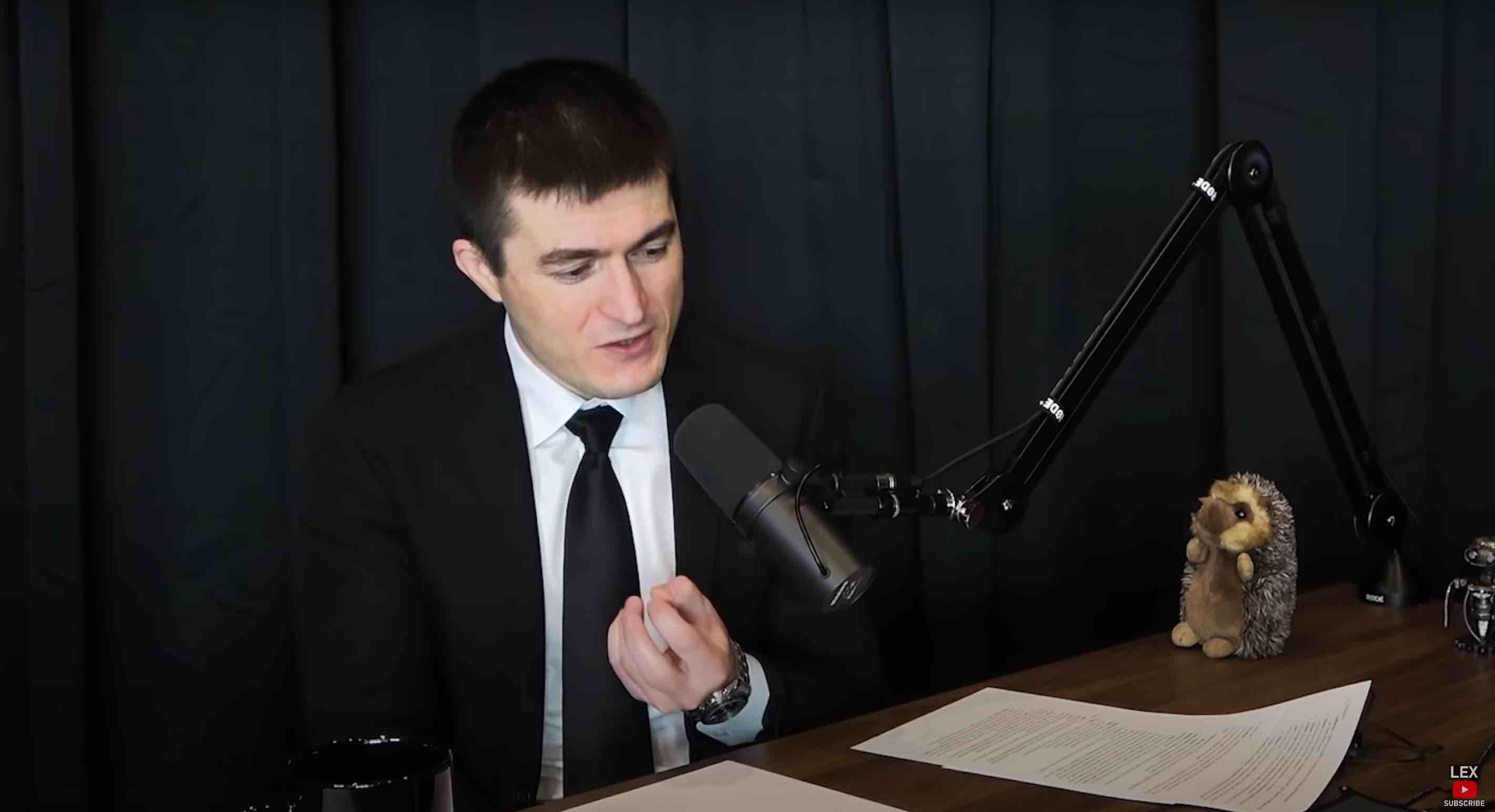Having a well-performing podcast can be attributed to many things. And one of them is having a script that can smoothly guide you through each recording.
Even some of the biggest and most experienced podcasters still keep some form of script by their side during recordings. It’s something to fall back on when needed and it brings an element of structure to each episode.
Take Lex Fridman for example. He’s currently one of the top-performing podcasters on YouTube, publishing interviews with a wide variety of scientists, entrepreneurs, and journalists. In most of his episodes, you can see his script (which he prints out) on the table in front of him.

There is no right or wrong when it comes to putting a podcast script together. Whether it’s just a few bullet points or a full word-for-word script depends on the kind of show you produce and how you like to work. In this article (and in the corresponding video below) we’ll cover the fundamental things you should include, some script-writing tips, plus templates you can use to get started right away.
What Is a Podcast Script?
A podcast script is basically a planned outline of your episode. A road map, if you will. It sets out everything you need to cover during the recording, keeping you on track and moving forward at the right pace.
Do You Need to Write a Podcast Script for Every Episode?
To put it bluntly, no. Writing a script for every episode isn’t a hard and fast necessity.
It can be useful though, and we’d always recommend you have some sort of episode roadmap to hand. Doing so will help you stay on the right track - anything to avoid those dreaded “I don’t know what to say next” moments, right?
On top of that, a script can make for a smoother production process. It can reduce the amount of mistakes (or awkward silences) made during the recording itself and it means you’re less likely to have to reshuffle parts of the episode during editing.
8 Things to Include in Your Podcast Script
Before we jump straight into the templates, it’s useful to have a general idea of the different factors that make up a good podcast script. We’ve rounded up 8 of them below.
1. Your Opening Sequence
It’d be a bit strange if a movie didn’t have a title sequence at the beginning, right? Well it’s the same for podcasts. It doesn’t need to be long, but it should include some sort of welcome message and jingle. This might involve quickly introducing yourself (the host) and giving a brief summary of your episode’s premise. You’ve got a small window to hook the listener in, so make it count.
2. A Message From the Episode’s Sponsor
Securing an episode sponsor is a big deal. Some sponsors will send you a pre-approved message that you can just read aloud verbatim. Others may provide a few key bullet points about their product or service that they’d like you to cover in your own words. If that’s the case, scripting something in advance is strongly advised. If your ad-read performs well, it can help you secure future partnerships.
3. Guest Introductions (If Applicable)
If you’ve got a guest appearing on your episode, introducing them at the beginning is a must. Your guest will be expecting you to do so. You should let your listeners know who you’re speaking to, what they do, why you’ve asked them to come on, and what value this person can give them in exchange for their time and attention.

Book Your Next Podcast Guest the Easy Way
With more than 70,000 members, MatchMaker.fm is the largest online community connecting podcasters & guests.
Join MatchMaker today4. A Segue, or Two
If you’ve listened to a few podcasts in your time, you’ll have noticed that there’s often a few segues. They signal a transition, for example, when there’s a change in topic. It might be the same jingle from your initial introduction, a sound effect, or a fan-favourite catchphrase. Including them in your script can help with the overall flow of your episode.
5. The Main Topics of Discussion
This is the part where you actually map out which topics and themes your episode will cover. Setting it out into segments on a page is useful for mapping out the main body of your recording, and helps to avoid any awkward pauses. This likely makes up the bulk of the notes Lex Fridman prints out for himself for his recordings.
6. A Summary
Adding a summary into your script is a nice way of drawing your episode to a close. When planning it out, you might want to leave this part blank so you can jot something down during the recording, like a good quote from your guest. Similarly, if you’d rather have something concrete to refer to, a reflection of all the discussed topics will do the job.
7. Your Outro
Outros are the ideal place to thank your audience for listening, and your guest for giving you their time. You might also want to bring back your jingle for the final time, to give your episode a conclusive finish. If you’ve got further episodes to release, let your listeners know here too.
8. Call-To-Actions
The final section of your script should be a call-to-action. Is there a specific something that you want your listeners to go away and do? This could be anything from subscribing to your newsletter, leaving you a review, or just following you on social media.
Podcast Script Templates for Different Show Formats
The following podcast script templates cater to the various types of show formats, like interviews and co-hosted discussions. They’re suggestions only, and you might need to tweak them based on the dynamics of your own show.
1. Solo Show Podcast Script
If you host a podcast on your own, having a detailed script to hand is useful. That’s because there’s nobody else to help you fill the silence, it’s all on you. And whilst that can be a daunting thought, putting together a list of points is often all you need to avoid those awkward pauses. Use the template below to map out your episode from start to finish.
Opening Sequence
- Welcome message
- Host introduction
- Episode premise and objectives
Sponsor message
Segue
Topic 1: ___
- Topic introduction
- Main points
- Supporting points
Segue
Topic 2: ___
- Topic introduction
- Main points
- Supporting points
Segue
Topic 3: ___
- Topic introduction
- Main points
- Supporting points
Summary Notes
- Topic recap
- Episode reflection
Outro
- Listener thanks
- Next episode teaser
Call-To-Action
- Shout out social media links
- Direct the listener to newsletter
- Any other relevant call-to-action
2. Co-Hosted Show Podcast Script
Co-hosted shows are the most popular type of podcasts. That’s because they’re naturally conversational and make it easy for the listener to feel like they’re chatting with friends. If you co-host a show, the main thing to factor into your script is time for both hosts to talk. How you structure this is up to you, but below is an example of one way to go about it.
Opening Sequence
- Welcome message
- Host introduction 1
- Host introduction 2
- Episode premise and objectives
Sponsor message
Segue
Topic 1: ___
- Host 1 gives topic introduction
- Host 1 presents main points
- Host 2 presents supporting points
- Host 1 & 2 discussion
Segue
Topic 2: ___
- Host 2 gives topic introduction
- Host 2 presents main points
- Host 1 presents supporting points
- Host 1 & 2 discussion
Segue
Topic 3: ___
- Host 2 gives topic introduction
- Host 1 presents main points
- Host 2 presents supporting points
- Host 1 & 2 discussion
Summary Notes
- Topic recap
- Episode reflection
- Host 1 & 2 discussion
Outro
- Listener thanks
- Next episode teaser
Call-To-Action
- Shout out social media links
- Direct the listener to newsletter
- Any other relevant call-to-action
If you host a round table discussion, you can use a similar structure to the above template. Just make sure that the moderator is introducing the topics, and each participant gets an equal opportunity to talk, like in the below video:
3. Interview Show Podcast Script
If you host an interview show, the format is simple. You’ll ask the questions and your guest will answer them. The answers that your guest gives will likely influence what you say next, so don’t worry about writing a majorly in-depth script. That being said, having a rough one to refer to can still be helpful. Use the below template to draw up an outline for your show.
Opening Sequence
- Welcome message
- Host introduction
- Episode premise and objectives
Sponsor message
Guest Name: ___
- Guest introduction
- Thank them for coming on the podcast
Segue
Question 1: ___
- Guest response
- Host and guest dialogue
Question 2: ___
- Guest response
- Host and guest dialogue
Question 3: ___
- Guest response
- Host and guest dialogue
Question 4 (and so on): ___
- Guest response
- Host and guest dialogue
Segue
Summary Notes
- Episode reflection
- Host and guest dialogue
Outro
- Guest and listener thanks
- Give the guest a chance to plug their work/social media/etc
- Next episode teaser
Call-To-Action
- Shout out social media links
- Any other relevant call-to-action
Word-for-Word Podcast Scripts vs Minimalist Podcast Scripts
The next two templates demonstrate different ways you can format your actual script. For example, word-for-word or minimalistic. Again, these are just suggestions and should be tweaked to suit your individual scripting style.
4. Word-For-Word Podcast Script
For podcasts that cover a lot of factual information, word-for-word scripts are often necessary. This means that they’re completely pre-written before recording. They’re also great for new podcasters who might need a confidence boost. Try to avoid sounding monotonous when reading it off though, you want to be as conversational as possible. Fill in the template below to get going.
Opening Sequence
- Welcome message
- Host introduction
- Episode premise and objectives
Sponsor message
Guest Name: ___
- Guest introduction
- Thank them for coming on the podcast
Segue
Topic 1: ___
- Topic introduction
- Main points
- Supporting points
- Guest input
Segue
Topic 2: ___
- Topic introduction
- Main points
- Supporting points
- Guest input
Segue
Topic 3: ___
- Topic introduction
- Main points
- Supporting points
- Guest input
Segue
Summary Notes
- Topic recap
- Episode reflection
Outro
- Guest and listener thanks
- Next episode teaser
Call-To-Action
- Shout out social media links
- Direct the listener to newsletter
- Any other relevant call-to-action
5. Minimalist Podcast Script
If you’re an experienced podcast host on the other hand, or you’re just confident that you don’t need a full blown word-for-word script, a minimalist one might be more suitable. Minimalist podcast scripts only really consist of a few bullet points to keep the host on course throughout the recording. And it might look something like this:
Opening Sequence
Sponsor Message
Guest name: ___
- Notes
- Thank them for coming on the podcast
Segue
Topic 1: ___
- Notes
Segue
Topic 2: ___
- Notes
Segue
Topic 3: ___
- Notes
Segue
Summary
- Notes
Outro
Call-To-Action
7 Tips for Writing a Great Podcast Script
Now that you’ve seen some scripting templates, you should hopefully have a good idea of what yours will look like. But before we wrap things up, here are 7 top tips that can really improve your podcast script writing skills.
1. Keep a Conversational Tone
Nobody wants to listen to an overly formal, boring podcast. It goes without saying. And that’s why it’s important to keep your script conversational. You want your listeners to enjoy it. And if they don’t, they’ll probably click off and go somewhere else. When putting your script together, try to write as you would actually speak.
2. Dictate Scripts for a More Natural Flow & Feel
If you're not a writer by trade, it can be very hard to craft scripts that sound natural. Rather than spending hours and hours improving your writing skills, you may find it easier to simply dictate parts of your script instead. All you need to do is communicate your point as if you were speaking to a friend, and use dictation software to transcribe your spoken words in real-time. The text can then be edited and tidied up if needed. This will ensure your script follows your natural speech patterns, and avoids clunky sentence structures and phrasing.
The Best Dictation Software in 2022
3. Paint the Scene for Your Listeners
If you’ve got a favourite podcast, you’ve probably built up an image in your head of what you think its studio or recording room actually looks like. The host might have even described it to you. You might want to consider doing the same somewhere in your script. If you can give the listener an idea and feel for your setting, they’ll immediately feel more familiar with your show. And this can help build a better host-to-listener connection.
4. Use Delivery Notes
It’s all in the delivery. And delivery notes are great for helping you maintain a steady and consistent pace throughout your script. Especially if you’re a new podcaster. So when you’re happy with how it’s looking, print it out and grab a pen. Then, just speak it out loud and mark down anywhere that you naturally pause, take a breath, laugh, or sigh. Doing this will add some life into your script and help with your overall confidence.
5. Get To Know Your Listeners’ Intent
Knowing your listeners' intent can steer your script in the right direction. For example, if you’re a show that examines various aspects of European culture, but 60% of your audience are only interested in what you have to say about certain cuisines, you’ll have a good idea of what it’ll take to satisfy your listener's intent. Food talk, of course. This is also especially useful for Q&A sessions. Again, by knowing which questions your audience wants answers to, you’ll know which ones to include in your podcast script.
6. Don’t Be Afraid to go Off-Script
Whilst podcast scripts are useful in many ways, try not to restrict yourself to one completely. If a conversation naturally progresses to a topic that’s not explicitly set out in your script, but it still makes for good and relevant content, go with it. Saving room in your script for riffing can help with this.
7. Run It Through Before Recording
This one goes without saying, but practice really does make perfect. Make sure you run through your script before you record it. Doing so can help to identify any errors or problems, which gives you time to tweak your script before it’s too late. If you throw caution to the wind and jump in prematurely, you risk running into problems that could have been easily avoided.
Summary
Hopefully by now you’ve got a better understanding of what makes a good podcast script, the benefits of writing one, and the various formats.
Podcast scripts are completely subjective to the host’s preference. The most important thing is to find out which format works best for you and the dynamic of your show.

The #1 Podcasting Community
With more than 70,000 members, MatchMaker.fm is the largest online community connecting podcasters & guests.
Join MatchMaker today





